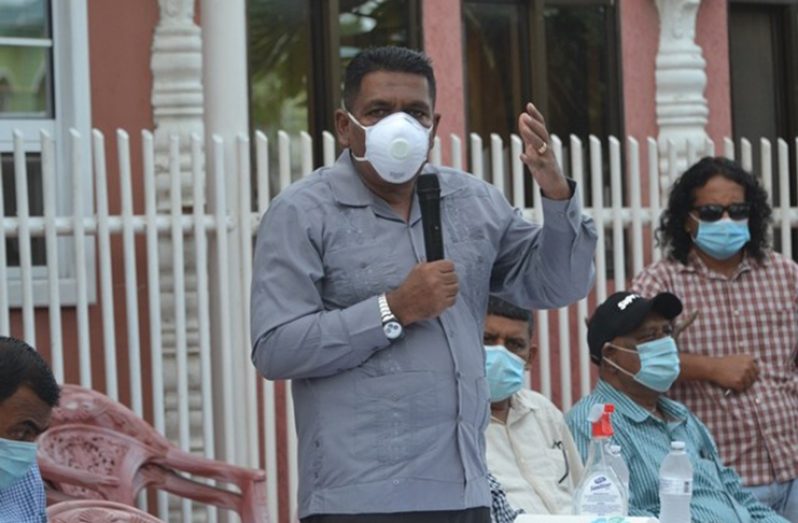— agriculture minister tells Hague farmers
By Naomi Parris
SUBSISTENCE farming will be a thing of the past as the Guyana Rice Development Board (GRDB) has commenced studies on a new genotype of rice farming for commercial cultivation in Guyana, Agriculture Minister, Zulfikar Mustapha, has announced.
He made the disclosure at a meeting with farmers at Hague, West Coast Demerara on Friday.
The minster, during the engagement, told those gathered that such programmes and research will soon see Guyana’s rice industry rising to new heights.
According to the GDRB’s report on the research being conducted on a rice farm at Hague, West Coast Demerara, the ultimate aim of the rice breeding programme is to develop varieties superior to the existing ones in yielding ability, disease resistance, tolerance to lodging, excellent milling and cooking characteristics.
It was also disclosed that one of the candidate farm’s variety has successfully completed the two rounds of testing in farmers’ fields during the first and second crop in 2020.
The minister noted that projects like the rice breeding programme will change the outlook of agriculture and rice farming in Guyana.
“Rice growing and rice cultivation had been with us since the inception when our forefathers came here… we have to move and advance ourselves in farming and in agriculture development. Gone are the days when we use to do subsistence farming just to exist and sell the produce,” he said.
He added that agriculture is considered to be a trade and such programmes “will bring benefit to the country” and “will ensure that every single citizen enjoy the wealth that will be coming into the country.”
‘PROACTIVE RATHER THAN REACTIVE’
The minister noted that during the campaign season, the Peoples’ Progressive Party Civic (PPP/C) had made several promises to enhance the agriculture sector and has begun doing so.
“When we went to the elections campaign, we made a lot of commitments to invest in agriculture, to modernise agriculture and rest assure all those commitments will be kept by the PPP/C Government,” he said.
He added: “We will continue to invest in agriculture, for this year alone, we have $18.4 billion dollars in the agriculture sector. We have the emergency fund, when you traverse certain areas, canals are clean, the dams are maintained that is how we are planning to work.”
Since his appointment, the minister and staff have spent their days in the field interacting with farmers and other stakeholders in the agriculture sector to address their concerns.
“We are looking across the country to see how we can improve, where we can give more lands to farmers, more benefits to farmers. We have started it already; we have reversed the increase of land rental and [distributable net income] D&I charges to farmers. Farmers now will have more monies in their pocket,” he said.
For example, he said: “If a farmer used to pay 1,000 in 2014 per acre and they have to pay after 2014 15,000, we have reversed it to the 2014 fees again so farmers will have more money in their pockets again.”
He added that the ministry and its agencies have become more efficient, responsive and proactive in ensuring the demands of the sector are met.
“Our agencies have to be more responsive. I told the senior officers of our agencies that I want them to be more proactive rather than reactive; when I made my budget last two weeks ago, I said that the Ministry of Agriculture will be more proactive and our extension officers and all other officers will go out in the field and I am a minister that will go out in the field,” he said.
‘RESPECT US’
Meanwhile, Ganga Persaud, the owner of a rice farm where the rice breeding programme is being conducted, noted that there is much more still to be done to enhance the programme and rice cultivation.
“Without research we will not be able to move on progressively, without extension we will not be able to pass on technology and because of these two factors I am of the opinion that they need to do more but in order to do more at research, you need budgetary allocation that will give researchers access to funding,” Persaud said.
He added: “A farmer is very important person and he received the blessings of God to produce a staple everybody eats and when you play me down, you are taking advantage of me…. My livelihood depends on this, my family depends on what I do out here and what I carry home.”
The minister also briefly visited the Den Amstel area and vowed to return to listen to the concerns of farmers in the region.












